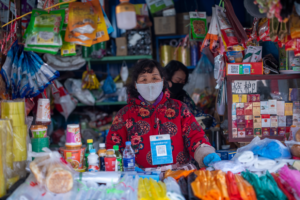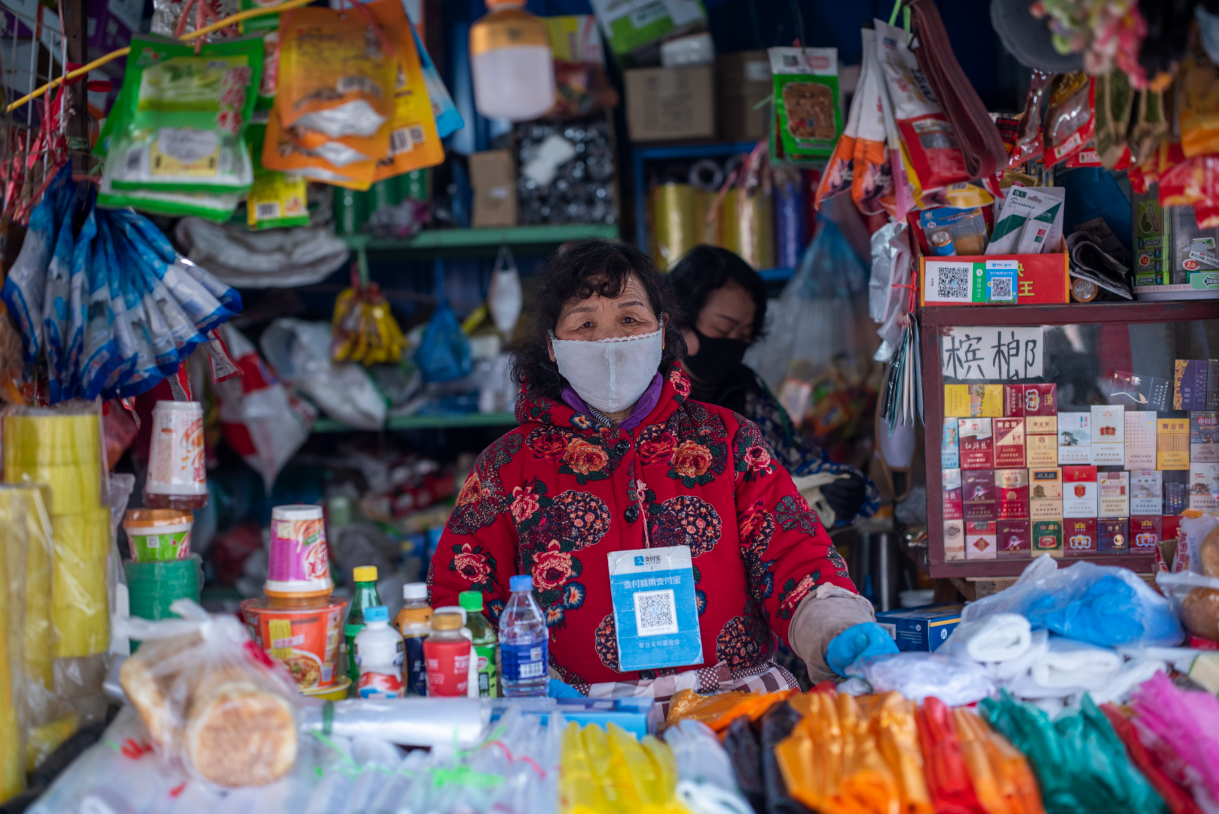
Since the start of 2020, countries across Asia have been living and coping with interruptions caused by the outbreak of COVID-19. The good news is that the maturity and reliability of technology such as video conferencing services like Zoom, online collaboration and chat apps like Slack and many grocery and food delivery apps have helped us continue living and working in a way that wouldn’t have been possible just five years ago.
Innovative technology companies have come up with and are working on solutions to get us through this difficult period. Below is a collection of references that showcase how digital technology can be a beacon enabling society to continue functioning during this outbreak. Hope they spark an idea for a story and if you are interested in any topics listed, please feel free to contact us for further commentary from Alipay.
PART 1 – Getting life back to normal
Living with a global virus outbreak is hard. But with perseverance and a lot of creativity, Chinese technology companies are showing how daily life can be close to normal as can be, without the need to get physical. Here’s a list of how virtual life in China has been like in these times of Covid-19.
WORK
- Remote work and education have thrived during this period. In China, millions of workers are using collaborative tools including Alibaba’s DingTalk, Tencent’s WeChat Work and Meeting, ByteDance’s Feishu and Huawei’s WeLink. These tools have also added new features including new quotas for video conference participants and call times, online health check-ins and industry-specific solutions.
- On March 5, MYbank, an online private commercial bank for small business under Ant Financial announced it jointly launched “Contactless Loans” in partnership with 100 Chinese banks, and leading industry organisations, aimed at supporting 10 million #SMEs, individual businesses, and farmers across China. Through the “310” lending model pioneered by Alipay and MYbank, loans take 3 minutes to apply on the mobile phone, approvals can be given within 1 second, and all this with zero manual intervention. For entrepreneurs, this gives easy access to the funding they need to get through the outbreak, without the need to travel to a branch in person.
LIVE
- With the spread of the virus fueling online rumours, Ding Xiang Yuan, a popular Chinese online content provider backed by a group of professional medical practitioners, has stood on the frontline to offer professional medical information, provide online medical checks for users and combat virus-related rumours. Additionally, Yikuang, a WeChat-based service developed by independent developers and app review site, Sspai.com, is helping to map neighbourhoods with confirmed cases using official data from local governments.
PLAY AND LEARN
- Millions of Chinese students are being forced to stay at home for an extended period of time, but digital technology is making sure they are not missing the opportunity to learn. On February 10, the first day of school after the CNY break, over 50 million students from more than 300 Chinese cities participated in the Online Classroom Program initiated by DingTalk and Youku, allowing more than 600,000 teachers to deliver their lessons via livestreaming.
PART 2 – Fighting the Covid-19
As the rest of China tries to get their daily life back to normal, Chinese technology companies are also putting their best innovations to work to help those at the frontlines fighting the coronavirus, with solutions aimed at preventing its further spread, and to seek a cure.
- Alibaba’s research institute, Damo Academy has developed a new AI-powered diagnosis system to detect new coronavirus cases via computerized tomography scans. Researches have trained the AI model with sample data from more than 5,000 confirmed cases, adding that the system could identify differences in CT scans between patients infected with the COVID-19 virus and those with ordinary viral pneumonia, with an accuracy of up to 96%.
- Alibaba Cloud has made its AI computing capabilities free to global public research institutions to help expedite virus gene sequencing, new drug R&D and protein screenings. Baidu opened its Smart Cloud Tiangong IoT platform to epidemic prevention-related projects and national epidemic prevention enterprises. And Tencent opened up its supercomputing facilities to help researchers working on a cure.
- Chinese drone maker DJI uses its agricultural spraying drones to spray disinfectant in potentially affected areas. Also, loudspeakers were mounted on drones to help disperse public gatherings in crowded places. Drones flew banners advising people how to learn more about precautions. Thermal cameras on drones were also used to monitor body temperature so medical staff can identify new potential cases.
- Blockchain technology is being used to ensure front-line medical workers in Hubei Province are getting the donations of face masks, medical materials, and cash that they badly need through a new blockchain-based donation tracking platform Shanzong, initiated by start-up Hyperchain and China Xiong’an Group. The online mutual aid platform Xiang Hu Bao, owned by Ant Financial, is also using blockchain technology to fast track claims payouts after adding Covid-19 as a critical illness eligible for a maximum one-time payout of 100,000 yuan (US$14,320).
PART 3 – Fun stuff
With an inflection point in the Covid-19 predicted to be somewhere around the corner, more of China’s netizens are also shaking off of the gloom brought by Covid-19, searching for creative new ways to enjoy themselves through digital technology.
- In Beijing, a brewpub called Jing-A Brewing Co. said it is remaining open but only for takeaway orders, deliveries to peoples’ residences and refills when people bring their own beer containers, known as growlers. The bar, which has a couple of locations in the Chinese capital, said it has extended its delivery hours from 11 a.m. to 11 p.m. Beijing time. Users can order through online delivery platform Meituan. Jing-A is offering deals on its beer delivery.
In Thailand, Robots and 5G have joined to contain the Covid-19 crisis in a joint undertaking by Advanced Info Service (AIS) and Chulalongkorn University. 5G has been used to enhance the capabilities of the medical robots. The robots monitor symptoms among people suspected of being infected and tend to those confirmed as infected. With the emergence of Covid-19, they were modified to help doctors and nurses take care of people infected or suspected of infection.

เริ่มต้นปี 2563 หลายประเทศในเอเชียต้องเผชิญกับการระบาดของไวรัสโคโรนาสายพันธุ์ใหม่ หรือโควิด-19 ซึ่งส่งผลกระทบต่อการใช้ชีวิต การทำงาน และการดำเนินธุรกิจ แต่ด้วยการใช้เทคโนโลยีที่ทันสมัย เช่น วิดีโอคอนเฟอเรนซ์อย่าง Zoom, แอปสำหรับการแชทและการทำงานร่วมกันทางออนไลน์อย่าง Slack และแอปบริการส่งอาหารและสินค้าต่างๆ ที่ช่วยให้ผู้คนสามารถใช้ชีวิตและทำงานได้อย่างต่อเนื่อง ซึ่งเป็นสิ่งที่เราไม่เคยมีเมื่อห้าปีที่แล้ว
บริษัทและเจ้าของเทคโนโลยีต่างๆ พยายามหาทางแก้ปัญหาเพื่อให้คนจีนหลายล้านคนผ่านช่วงเวลาที่วิกฤตนี้ เรื่องราวเหล่านี้เป็นกรณีศีกษาว่าเทคโนโลยีดิจิทัลสามารถนำทางและช่วยคนจีนฝ่าฟันอุปสรรค และใช้ชีวิตต่อไปอย่างไรในช่วงที่มีการระบาดของโรค เราหวังว่ากรณีศึกษาต่างๆ เหล่านี้จะช่วยจุดประกายความคิดท่ามกลางสถานการณ์ที่ยากลำบาก หากท่านสนใจในหัวข้อใดหัวข้อหนึ่งในกรณีศึกษาเหล่านี้ สามารถติดต่อสอบถามเพื่อขอคำอธิบายเพิ่มเติมได้ที่ อาลีเพย์
ช่วงที่ 1 – การทำให้ชีวิตกลับคืนสู่ปกติ
การใช้ชีวิตท่ามกลางการระบาดของไวรัสโควิด-19 ทั่วโลกนับเป็นเรื่องที่ลำบากอย่างยิ่ง แต่ด้วยความคิดสร้างสรรค์ที่หลากหลาย บริษัทเทคโนโลยีต่างๆได้นำเสนอโซลูชั่นที่ช่วยให้คนจีนใช้ชีวิตได้ใกล้เคียงปกติมากที่สุด เช่น
การทำงาน
- การทำงานและการศึกษาผ่านออนไลน์ได้รับความนิยมอย่างแพร่หลายในช่วงนี้ ในประเทศจีน บุคลากรหลายล้านคนใช้เครื่องมือในการทำงานร่วมกัน เช่น DingTalk ของอาลีบาบา, WeChat Work and Meeting ของเท็นเซ็นต์, Feishu ของไบต์แดนซ์ และ WeLink ของหัวเว่ย เครื่องมือเหล่านี้เพิ่มฟีเจอร์ใหม่ๆ เช่น โควตาสำหรับผู้เข้าร่วมการประชุมและระยะเวลาในการโทร, การตรวจสุขภาพออนไลน์ และโซลูชั่นสำหรับอุตสาหกรรมที่เฉพาะเจาะจง
- ในวันที่ 5 มีนาคม มายแบงค์ (MYbank) ซึ่งเป็นธนาคารพาณิชย์เอกชนสำหรับธุรกิจขนาดเล็กในเครือแอนท์ไฟแนนเชียล (Ant Financial) ได้เปิดตัวการบริการกู้ยืมเงิน “Contactless Loans” ภายใต้ความร่วมมือกับธนาคารของจีนและองค์กรชั้นนำกว่า 100 แห่ง โดยมีจุดมุ่งหมายเพื่อให้ความช่วยเหลือแก่ธุรกิจเอสเอ็มอี ผู้ประกอบการรายย่อย และเกษตรกรกว่า 10 ล้านรายทั่วประเทศจีน ผ่านโมเดลการกู้ยืม “310” ซึ่งอาลีเพย์และมายแบงค์เป็นผู้บุกเบิก โดยใช้เวลาเพียง 3 นาทีในการยื่นเรื่องขอกู้ยืมเงินผ่านโทรศัพท์มือถือ และอนุมัติทันทีภายใน 1 วินาที โดยทุกขั้นตอนดำเนินการโดยระบบอัตโนมัติ หรือ Zero (0) Manual Intervention นับเป็นช่องทางที่สะดวกรวดเร็วสำหรับผู้ประกอบการในการเข้าถึงแหล่งเงินทุนในช่วงเวลาที่เกิดการแพร่ระบาดของไวรัสโดยไม่ต้องเดินทางไปติดต่อที่สาขาของธนาคารด้วยตนเอง
การใช้ชีวิต
- ท่ามกลางการแพร่ระบาดของเชื้อไวรัสซึ่งก่อให้เกิดข่าวลือมากมายในโลกออนไลน์ Ding Xiang Yuan ผู้ให้บริการคอนเทนต์ออนไลน์ยอดนิยมของจีน ภายใต้การสนับสนุนของบุคลากรทางการแพทย์ ได้ดำเนินการอย่างจริงจังเพื่อนำเสนอข้อมูลทางการแพทย์ที่มีประโยชน์ บริการตรวจเช็คอัพร่างกายทางออนไลน์ และการจัดการกับข่าวลือเกี่ยวกับไวรัสโควิด-19 นอกจากนี้ Yikuang ซึ่งเป็นบริการในเครือ WeChat ผลงานของนักพัฒนาอิสระ และแอป com ก็ช่วยจัดทำแผนที่เพื่อระบุเคสผู้ป่วยที่ได้รับการยืนยันในพื้นที่ใกล้เคียง โดยใช้ข้อมูลจากทางการจีน
การเล่นและเรียนรู้
- นักเรียนนักศึกษาชาวจีนหลายล้านคนจำเป็นต้องหยุดอยู่บ้านเป็นเวลานาน แต่เทคโนโลยีดิจิทัลช่วยให้พวกเขาไม่พลาดโอกาสที่จะเรียนรู้อย่างต่อเนื่อง เมื่อวันที่ 10 กุมภาพันธ์ ซึ่งเป็นวันเปิดเทอมวันแรกภายหลังการแพร่ระบาดของเชื้อไวรัสโควิด-19 นักเรียนนักศึกษากว่า 50 ล้านคนในเมืองต่างๆ กว่า 300 เมืองของจีนได้เข้าร่วมโครงการห้องเรียนออนไลน์ ซึ่งริเริ่มโดย DingTalk และ Youku โดยเปิดโอกาสให้อาจารย์กว่า 600,000 คนเปิดสอนวิชาต่างๆ ผ่านระบบไลฟ์สตรีม
ช่วงที่ 2 – การต่อสู้กับเชื้อไวรัสโควิด-19
ขณะที่หลายพื้นที่ในประเทศจีนพยายามฟื้นฟูวิถีชีวิตให้กลับคืนสู่ปกติ บริษัทเทคโนโลยีของจีนได้นำเสนอนวัตกรรมที่เหนือชั้นในการต่อสู้กับเชื้อไวรัสโควิด-19 โดยใช้โซลูชั่นที่ช่วยยับยั้งการแพร่ระบาดและค้นหาวิธีการรักษาโรค เช่น
- Damo Academy ซึ่งเป็นสถาบันวิจัยของอาลีบาบา ได้พัฒนาระบบวินิจฉัยโรคโดยอาศัยเทคโนโลยี AI เพื่อตรวจจับเคสผู้ติดเชื้อรายใหม่ผ่านการเอกซเรย์คอมพิวเตอร์ (CT Scan) ซึ่งนักวิจัยได้ฝึกฝนโมเดล AI โดยใช้ข้อมูลตัวอย่างจากเคสผู้ป่วยที่ได้รับการยืนยันกว่า 5,000 ราย ช่วยให้ระบบสามารถระบุความแตกต่างในภาพ CT Scan ระหว่างผู้ป่วยที่ติดเชื้อไวรัสโควิด-19 กับผู้ป่วยโรคปอดบวมทั่วไป โดยมีความแม่นยำสูงถึง 96%
- อาลีบาบา คลาวด์ (Alibaba Cloud) เปิดให้สถาบันวิจัยของรัฐเข้าใช้งานระบบประมวลผล AI ของบริษัทฯได้ฟรี เพื่อช่วยเร่งขั้นตอนการจัดลำดับยีนของไวรัส การวิจัยและพัฒนายารักษาโรค และการคัดกรองโปรตีน ขณะเดียวกัน ไป่ตู้ (Baidu) ก็ได้เปิดแพลตฟอร์ม Smart Cloud Tiangong IoT สำหรับโครงการที่เกี่ยวข้องกับการป้องกันการแพร่ระบาด รวมถึงหน่วยงานภาครัฐที่มีหน้าที่ยับยั้งการแพร่ระบาด ส่วนเท็นเซ็นต์ก็ได้เปิดให้ใช้งานระบบ Supercomputing เพื่อช่วยให้นักวิจัยคิดค้นวิธีการรักษาโรค
- DJI ผู้ผลิตโดรนของจีน นำเอาโดรนที่ใช้ในการพ่นสารเคมีในภาคการเกษตรมาใช้ในการฉีดพ่นยาฆ่าเชื้อในบริเวณที่อาจมีการติดเชื้อ นอกจากนี้ยังมีการติดตั้งลำโพงไว้กับโดรนเพื่อช่วยในการแจ้งเตือนให้ประชาชนหลีกเลี่ยงการชุมนุมในพื้นที่หนาแน่น และมีการบินโดรนที่ติดป้ายประกาศแจ้งเกี่ยวกับมาตรการป้องกัน รวมถึงมีการติดตั้งกล้องตรวจจับความร้อนไว้บนโดรนเพื่อตรวจวัดอุณหภูมิร่างกายของประชาชน ช่วยให้คณะแพทย์สามารถระบุเคสที่ต้องสงสัยได้อย่างรวดเร็ว
- มีการใช้เทคโนโลยีบล็อกเชน (Blockchain) เพื่อช่วยให้บุคลากรทางการแพทย์ในมณฑลหูเป่ยได้รับบริจาคหน้ากากอนามัย เครื่องมือทางการแพทย์ และเงินบริจาค ซึ่งจำเป็นอย่างมากต่อการดำเนินงาน โดยผ่านแพลตฟอร์ม Shanzong สำหรับการตรวจสอบติดตามเงินและสิ่งของบริจาคโดยอาศัยเทคโนโลยีบล็อกเชนซึ่งเป็นผลงานการพัฒนาของบริษัทสตาร์ทอัพ Hyperchain และ China Xiong’an Group นอกจากนี้ แพลตฟอร์มที่ให้ความช่วยเหลือทางออนไลน์ Xiang Hu Bao ของแอนท์ไฟแนนเชียล ก็ใช้เทคโนโลยีบล็อกเชนเพื่อตรวจสอบติดตามการจ่ายเงินเคลมประกันอย่างรวดเร็ว หลังจากที่มีการเพิ่มโควิด-19 ไว้ในรายชื่อโรคติดต่อร้ายแรงที่สามารถเคลมประกันได้สูงสุด 100,000 หยวน (14,320 ดอลลาร์ หรือประมาณ 460,000 บาท)
ช่วงที่ 3 – เรื่องราวสนุกๆ และผ่อนคลาย
ขณะที่การแพร่ระบาดของเชื้อไวรัสโควิด-19 ใกล้จะถึงจุดเปลี่ยน ชาวจีนจึงเริ่มมองหาวิธีผ่อนคลายจากภาวะความเครียดที่เกิดจากการแพร่ระบาดของโรค โดยอาศัยเทคโนโลยีดิจิทัล เช่น
- ที่กรุงปักกิ่ง ผับมีชื่อว่า Jing-A Brewing Co. ยังเปิดให้บริการโดยรับเฉพาะออเดอร์ที่สั่งอาหารและเครื่องดื่มกลับบ้าน และให้บริการส่งอาหารถึงบ้าน รวมถึงรีฟิลสำหรับลูกค้าที่นำเหยือกแก้วใส่เบียร์มาเอง บาร์แห่งนี้มีสองสาขาในกรุงปักกิ่งได้ขยายเวลาให้บริการจัดส่งอาหารเป็น 100 น. ถึง 23.00 น. ลูกค้าสามารถสั่งอาหารและเครื่องดื่มผ่านทางแพลตฟอร์มออนไลน์ Meituan และทางผับก็ยังให้ส่วนลดพิเศษสำหรับบริการจัดส่งเบียร์อีกด้วย
สำหรับประเทศไทย บริษัทแอดวานซ์ อินโฟร์ เซอร์วิส (เอไอเอส) และจุฬาลงกรณ์มหาวิทยาลัย ก็ได้ร่วมมือกันในการใช้เทคโนโลยีหุ่นยนต์และ 5G เพื่อช่วยควบคุมวิกฤตการณ์โควิด-19 โดยมีการใช้ 5G เพื่อปรับปรุงความสามารถของหุ่นยนต์ทางการแพทย์ ซึ่งทำหน้าที่ตรวจวินิจฉัยอาการของผู้ป่วยที่สงสัยว่าอาจติดเชื้อ และช่วยเหลือแพทย์และพยาบาลในการดูแลผู้ป่วยที่ติดเชื้อหรือสงสัยว่าอาจติดเชื้อ

